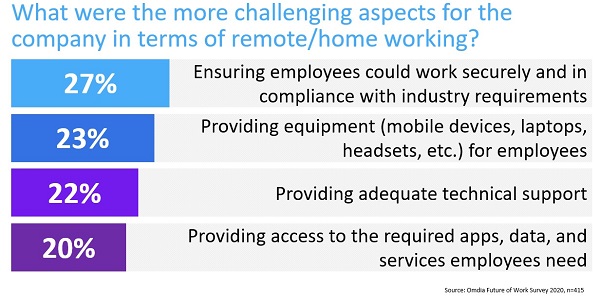A key challenge most businesses have experienced during the pandemic relates to supporting a more mobile and digitally enabled workforce and delivering the appropriate technical assistance as needed. In our recent Future of Work survey, Omdia found that IT and HR leaders identified providing adequate technical support as one of the top three challenges experienced by businesses looking to rapidly adapt to remote work styles, as shown in the graphic below.
Optimizing technical support has long been a focus area for IT service management solutions. However, delivering support that extends beyond the typical “break/fix” technical model is now a vital focus for businesses, particularly as concerns around employee wellbeing and their workplace experience have intensified during the pandemic. While initiatives to help improve support and employee experience are nothing new, the priority that businesses now attach to these efforts has significantly increased during the current global crisis and the subsequent shift to remote working.
Toward that end, Salesforce recently
announced a variety of new capabilities for its Work.com platform aimed squarely at helping enterprises deliver better employee experiences. The most notable of these capabilities is IT Service Center (ITSC), an enterprise service management (ESM) product Salesforce developed in partnership with Tanium, which has expertise in endpoint and security management. Salesforce’s formal move into ESM not only is significant given the vendor’s heritage, but also smart given the huge opportunity that exists for service management solutions to better integrate the front and back office, digitize business workflows, and help improve employee experiences.
The Battle for the Back Office Is On
Since launching Work.com in 2020, Salesforce has been evolving the solution into a comprehensive employee experience platform built to empower HR and IT teams and beyond. ITSC is one of two new solutions that significantly enhance the platform, broadening the use cases it supports and increasing its enterprise value proposition. The other is Employee Concierge, a self-service help desk tool that uses knowledge articles and artificial intelligence (AI)-powered recommendations to help employees find answers to questions and issues.
These new capabilities undoubtedly put Salesforce in greater competition with ServiceNow, which has its heritage in delivering IT-focused back-office solutions but has made great progress over recent years by introducing new capabilities that support other business functions. Salesforce’s trajectory is slightly different in that the vendor is building on its customer service and front-office heritage and looks to strengthen its appeal with the back office. ITSC is the solution that Salesforce hopes will help it achieve this goal.
With ITSC, the objective is to deliver an enterprise-wide platform that helps enterprises better digitize, orchestrate, and automate processes and workflows that extend across multiple different business units, including IT, HR, facilities management, and custom service teams. This type of capability and rich integration benefits service delivery in many ways, such as in making remediation and provisioning tasks quicker to execute, or in making the employee onboarding experience quicker and more efficient, which in turn, helps improve employee satisfaction and productivity. It is still the early days, and Salesforce has a long way to go in reaching a significant level of feature parity with ServiceNow around areas such as IT operations management. However, Salesforce’s intent to make an impact in this market is clear, and the vendor’s formal move into service management is one of the most significant things to happen in this area for some time.





